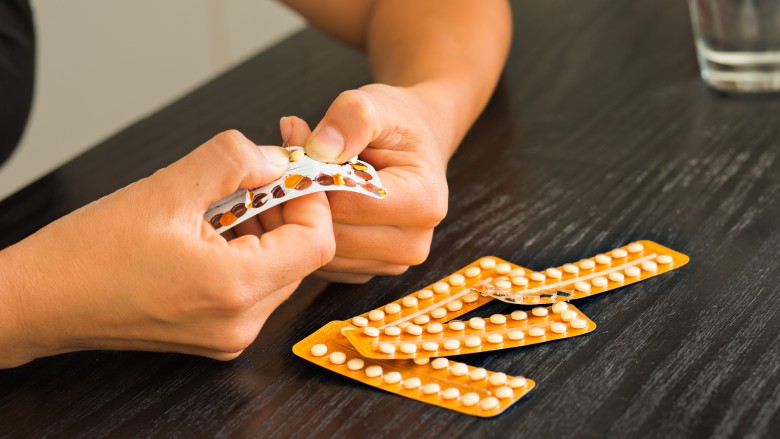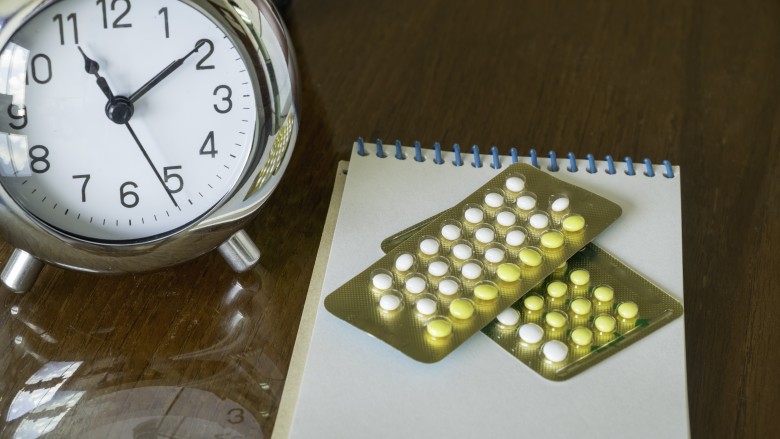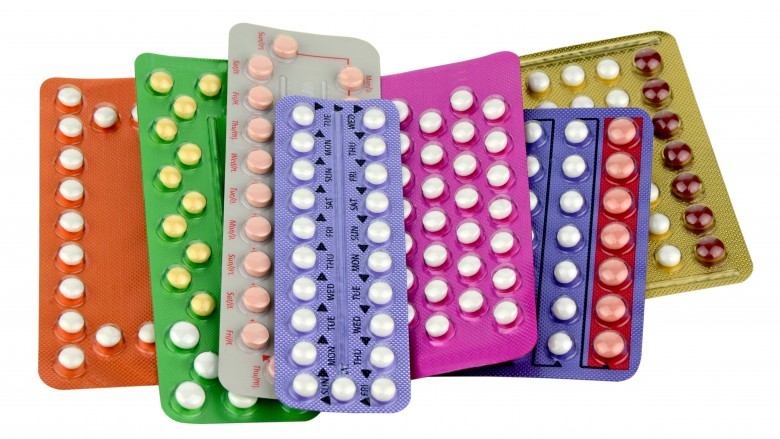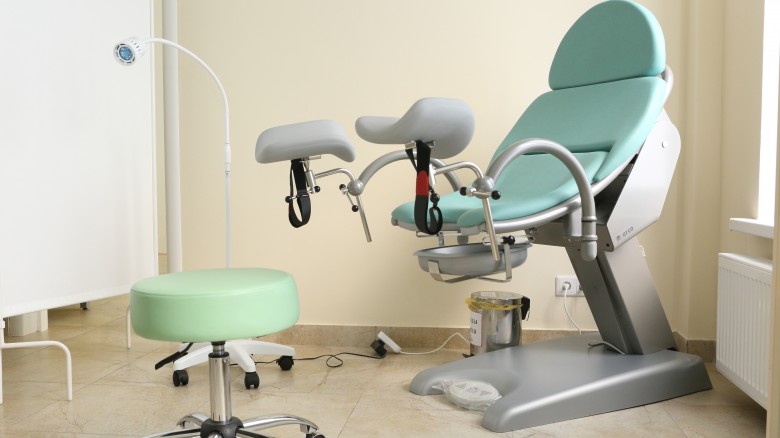What Really Happens When You Go On The Pill
When oral contraceptives, or "the pill" as they're more commonly known, were approved by the Food and Drug Administration (FDA) in 1957, it was meant for severe menstrual disorders. Luckily, in 1960, the pill was approved for contraceptive use. Five years later, more than 6.5 million American women were taking the pill. When someone talks about the pill today, they could mean one of any number of types. From combination pills to progesterone only pills, the options for oral contraceptives are aplenty. How do you decide if the pill, and which pill, is right for you — and what really happens when you start?
Effectiveness of the pill
The decision to use oral contraceptives as your means of birth control may be based on many factors, of which effectiveness is only one. That said, when taken properly, oral contraceptives can be up to 99 percent effective, according to Planned Parenthood. That, however, is in a perfect world. In reality, the pill ends up being about 91 percent effective, with nine out of 100 women getting pregnant on the pill each year. What decreases the pill's effectiveness, you ask? Forgetting to take it can be a huge factor.
Remembering to take the pill
One of the things that you have to think about when deciding whether the pill is for you is how well you'll remember to take it at the same time each day. This is very important for the pill to be effective, and research has shown that women are generally not great at being consistent without reminders. In general, the dosage of the pill is designed for you to take an active pill (one containing hormones) every day for three weeks, then switch to inactive pills (those without any hormones) every day for a week. It is during this week of inactive pills when you will get your period. You may think it isn't important to take the inactive pills because they have nothing in them, but sticking to your routine of taking a pill every day, active or not, helps you remember to take them when it really matters. Women use a variety of tactics to remember their pill each day, ranging from setting an alarm on their phone to taking the pill with the same meal daily. Whatever your method, remembering to take the pill will become a large part of your routine after you get your prescription.
Getting your prescription
Speaking of getting your prescription, how do you do that? You'll need to visit a doctor or nurse to get a prescription for the pill, but according to Planned Parenthood, these visits don't generally require a pelvic exam. The doctor or nurse will check your blood pressure and talk to you about your health history, including any other forms of birth control you've used in the past and how your body tolerated them. Insurance plans available under the Affordable Care Act cover birth control at the time of this writing, so the pill may cost you very little or nothing at all. Once you have your prescription you can get the pill at a drugstore, health clinic, a Planned Parenthood location, or in some regions, online.
Different kinds of pills
While there are many brand names and dosages of birth control pills, there are generally two main kinds, both of which use hormones to prevent pregnancy. Combination pills contain both estrogen and progestin while "mini pills" contain only progestin. While combination birth control pills are designed to primarily stop ovulation, progestin-only pills cause a thickening of cervical mucus that makes it difficult for sperm to enter the uterus, thin the lining of the uterus to make it less likely for a fertilized egg to attach, and only in some cases stop ovulation completely. The difference between the two kinds are often in the side effects and how sensitive your body is to hormones. Because there are fewer hormones in progestin-only pills, some women tolerate them better than combination pills. But because progestin-only pills contain fewer hormones, remembering to take your pill at the same time every day is even more important. This is because the thickening of cervical mucus only lasts for 24 hours, after which you're at risk once again for pregnancy. Once you and your doctor decide which type of pill is right for you, it is important to know that there are some potential side effects for both combined and progestin-only oral contraceptives so you can ready yourself for what to expect.
Your mood might change, for better or worse
When you first start taking the pill, you may notice a change in your mood. While some women report experiencing depression once beginning to take birth control pills, research has shown that there is no significant relationship between type of birth control and rates of depression. Some researchers argue that the pill can actually reduce premenstrual symptoms of depression in some women, particularly if they were experiencing symptoms of depression prior to going on the pill. This varies, somewhat, depending on whether you are taking combination pills or the mini pill. At least one study found that the progestin-only mini pill is more likely to lead to symptoms of depression than combination pills that contain estrogen.
Your PMS symptoms might go away
I spoke with Dr. Gayle Yatawara, who told me that the pill might be a really great choice for someone who experiences symptoms of premenstrual syndrome in addition to mood swings. "The natural menstrual cycle is one of flux with constant hormonal changes," Dr. Yatawara told me, explaining that these hormonal changes are what lead to some of our PMS discomforts like breast tenderness, acne, mood swings, and bloating. "When we start taking the pill, our hormones are stabilized," she said. "So, we (most of the time) experience a decrease in [these symptoms]." While this doesn't happen 100 percent of the time, researchers have also made recommendations for the use of the pill in cases of extreme PMS, known as premenstrual dysphoric disorder.
You might gain weight
Another reported side effect of birth control pills is weight gain. In fact, many patients and doctors believe that hormonal birth control pills can lead to weight gain, though there is no definitive research that suggests the pill (in either form) causes weight gain. In a blog post for Psychology Today, Dr. Mary E. Pritchard suggests that the weight gain often associated with the pill may be related to overall increased hunger. Given that one symptom of depression can be weight gain, it is also possible that mood changes associated with taking the pill could be playing a role in fluctuations in weight.
Your risk for blood clots increases
Oral contraceptives have been associated with a greater risk of blood clots since at least the 1970s. While this link is strongly established, it is more well understood in recent years as something that can be controlled with proper screening. This is why a blood pressure reading is one component of the physical exam required before getting a prescription for the pill. It is also why your medical history and your family's medical history are important to disclose. While blood clots are a rare side effect of taking the pill, the risk is the highest during the first month of contraceptive use. It's also important to know that some pills may increase your risk more than others. While the main ingredients in birth control are estrogen and progestin, they aren't the only ingredients — and some of these other ingredients can increase or decrease risk. Specifically, types of birth control containing drospirenone have been investigated by the FDA for an increased risk of blood clots compared to pills without it.
Headaches could get worse
While the pill is not recommended for women who get migraine headaches with aura (as the pill can increase the risk of stroke in these women), around 10 percent of women get new onset headaches when they start taking the combination pill. If you already have headaches, they could also start to become more frequent or more painful. This is important to note because research suggests that up to a third of women have some sort of primary headache disorder during their childbearing years. If headaches are a concern for you, talk to your doctor about whether progestin-only pills may be a good choice for you or if there are other options. In the end, the pain of a headache may be worth the benefits of the pill, but only you and your doctor can make that decision.
Your sex drive could decrease
What a cruel joke: when you start taking a medication to prevent pregnancy, you may actually be less likely to want to engage in baby-making activities at all. Decreased libido is thought to be related to the decrease in bioavailable testosterone while taking the pill, and supplementing testosterone has not proven to be any more effective than a placebo in managing this symptom. Some research has shown that pills with lower estrogen levels may make you more likely to lose sexual desire and experience vaginal dryness, leading some doctors to suggest a pill with slightly higher levels of estrogen if this is a concern. Again, however, it is important to note that decreased libido is also associated with depression and body image concerns, so if you are experiencing depression-related symptoms or you've gained weight and feel uncomfortable in your skin, these might also be reasons your sexual desire has decreased.
Your risk for some forms of cancer decreases
The risk for both ovarian cancer and endometrial cancer has been shown to decrease with oral contraceptive use. Considering all the possible negative side effects of the pill, this is a huge possible benefit. Researchers also suggest that the longer you use the pill, the more protected you are from ovarian cancer specifically. Some research also shows a decrease in risk for colorectal cancer with the use of oral contraceptives, but unfortunately that same research showed an increased risk of breast and cervical cancer relative to those who have never used the pill. Get to know your family health history and discuss your risk with your doctor before choosing a method of birth control.
Your acne may improve
While it may not be the reason you decide to start taking the pill, it turns out that the combination pill with both estrogen and progestin can actually help clear up acne. This is because the combination birth control pill helps balance the male sex hormone androgen that is produced in both males and females during puberty and has been implicated in the development of acne. Researchers are quick to point out, however, that the negative side effects of the pill should be weighed against the potential benefits, given that other acne treatments may be just as effective.
Your fertility might actually increase
I spoke with Dr. Stephanie Beall from Shady Grove Fertility, who told me she sometimes uses birth control pills at the beginning of treatment with her patients. "In some cases, we use birth control pills for two to four weeks at the start of fertility treatment to synchronize the ovaries' response to stimulation medications," she said. "The pill 'quiets' all of the follicles (resting eggs) and helps to ensure that the follicular growth is consistent." Dr. Beall also told me that the pill can help ensure the resting eggs start developing at the same starting line, which helps to prevent one 'dominant' follicle from developing prior to starting in vitro fertilization (IVF) medications. She added that for women with polycystic ovary syndrome (PCOS), a short period of birth control can suppress other reproductive hormones, which she said has shown to improve IVF treatment outcomes. Who knew that birth control could help you get pregnant?
The pill is one of many options
While no form of birth control is perfect, the pill is not necessarily the right choice for everyone. In fact, nearly 30 percent of women have used more than one method in their lifetime. There are many forms of birth control, including hormonal and nonhormonal options, from which you can choose. These may include the Depo-Provera injection, an intrauterine device (IUD), an upper arm implant, or other options that your doctor may suggest based on your health history and what you're looking for. If knowing what really happens when you go on the pill has left you wanting something more out of your birth control, talk to your doctor about all of the options available to you.














